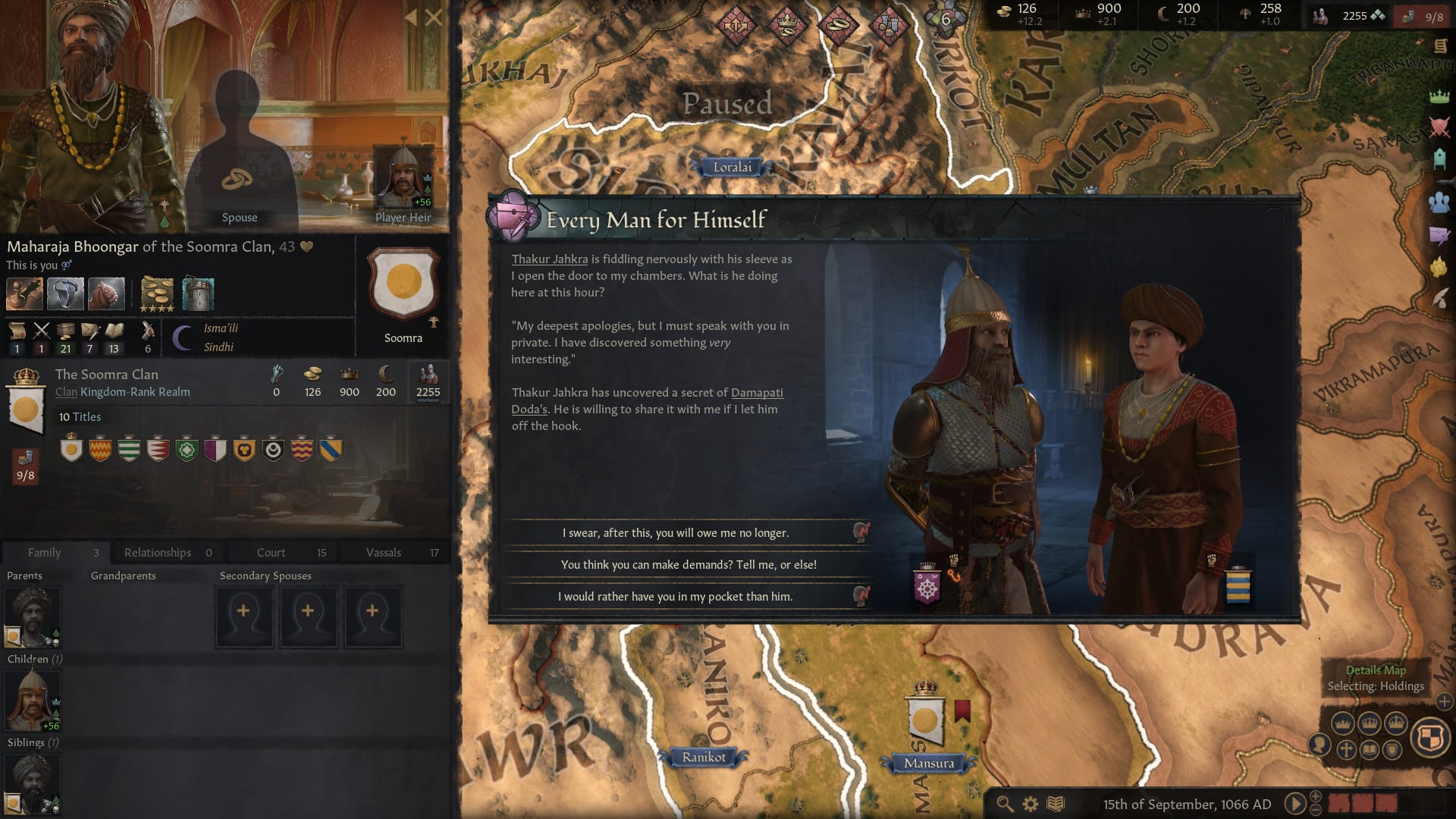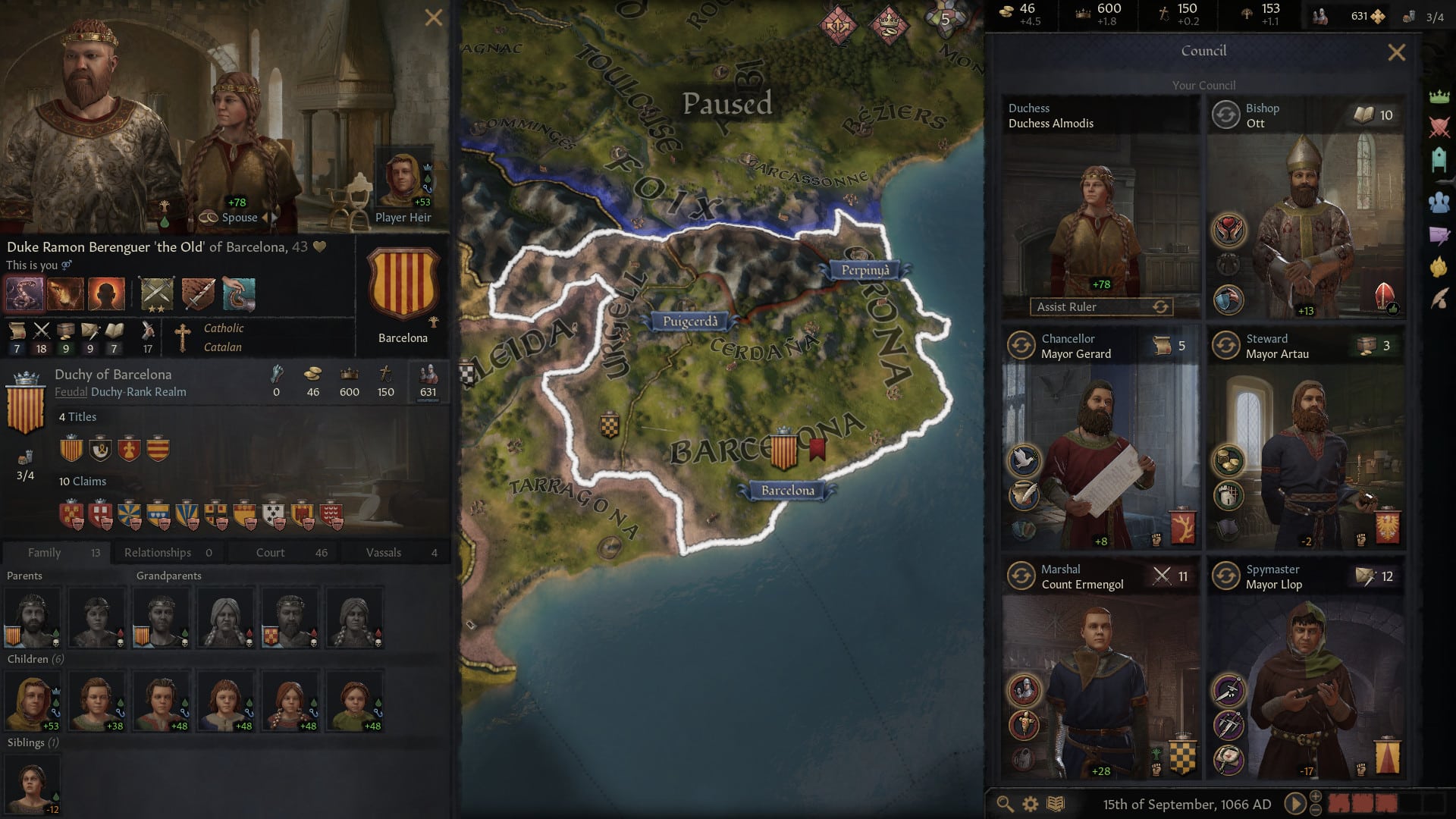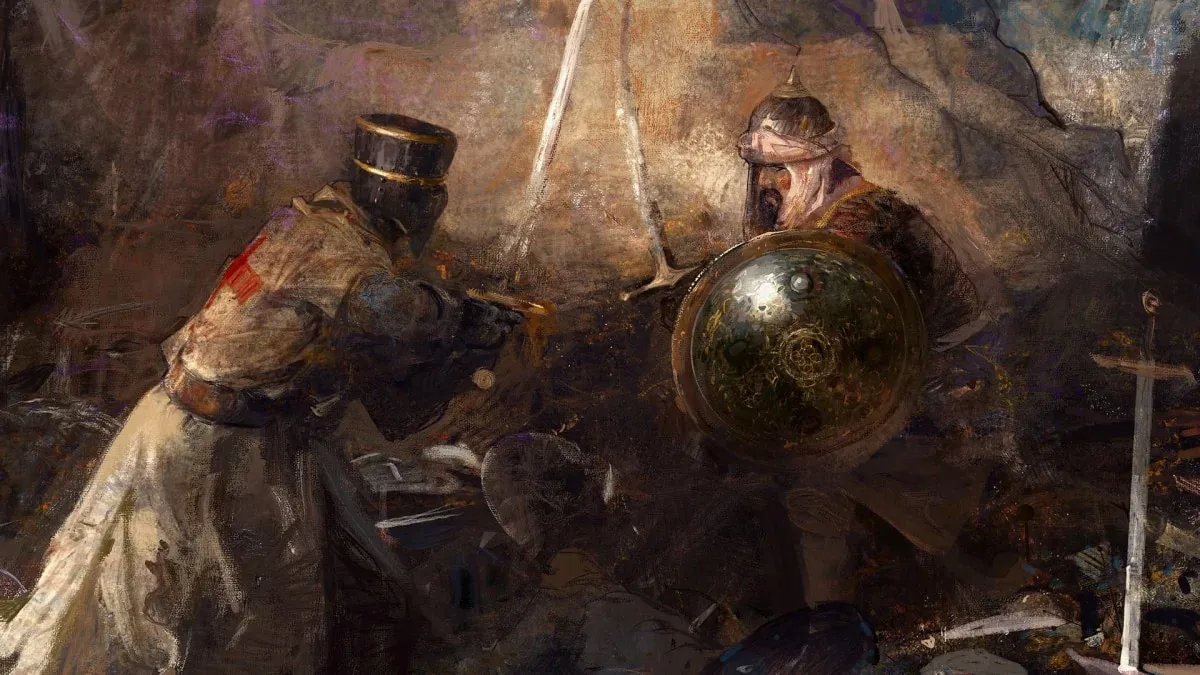About five years ago my friend tried to get me into Crusader Kings II, Paradox Interactive’s famously complex medieval history generator, by telling me it has the option to marry one’s offspring off to a goat. It was an easy sell, but after several hours of staring at tutorial screens and no closer to staring at goats, I gave up and was too intimidated to return to it. Crusader Kings III is an excuse to try again. This time I’m determined to persevere, and also see if there are some things a complete beginner like me might understand quickly to break into this grandest of the grand strategy games.
At its core, Crusader Kings III is about maintaining your dynasty. The only game over condition is that whoever you are currently playing as dies without leaving an heir. Losing land and being reduced to a petty vassal of some moronic lordling or never rising out of being a moronic lordling yourself are both perfectly acceptable ways to play the game. Granted, they aren’t very satisfying, but the point is that there is no need to stress if you are not doing “standard strategy game stuff”: conquering, expanding, growing culture, and whatnot. This removed some of the immediate anxieties from the game for me, and it gave me breathing room to learn at my own pace.
To begin with, I noticed that Crusader Kings III seems to be designed through two basic principles: operationalization and abstraction. This helped me to see how I could learn to play it.
Operationalization is the characterization of something by its interaction with something else. In the Crusader Kings III tutorial you play as Murchad mac Donnchad of Ireland, a petty king who is temperate and impatient. These traits have some nice flavor text, but the key is how they affect, and are affected by, other parts of the game. Being temperate gives a bonus to stewardship, where stewardship is in turn defined by its effect on things like the level of taxation. Meanwhile, being impatient gives a penalty to learning, which affects how much piety is generated, essentially a form of currency to spend on religious decisions.
Indeed, Crusader Kings III operationalizes everything I associate with medieval history, from inbreeding and the pox to spousal murder. It is what makes it a fantastic history generator and one of the purest expressions of emergent gameplay in the medium, but it’s also what makes it so intimidatingly dense.
The most significant mistake I made with Crusader Kings II was attempting to understand every single operationalization that it presented me with straight away. Every time it introduced something new, I hovered over it to look up what it did, which brought up its own unfamiliar set of terms, until I was trapped in a regress of definition-checking and cross-checking.
With Crusader Kings III, I let the tutorial carry me along, barely dipping into the additional information until I had a general grasp of all the things the developers wanted to show me first. And the learning curve was much smoother: I was making largely unguided decisions within a couple of hours, and I was reasonably comfortable and completely addicted within a weekend.
This brings me to abstraction. Abstraction is the derivation of something general from something specific. For example, in Crusader Kings III empires are derived from kingdoms, kingdoms from duchies, duchies from counties, and counties from baronies. Thus, empires are ultimately abstractions from baronies, but that does not necessarily mean that everything that affects baronies affects empires, or vice versa.

The second mistake I made with Crusader Kings II was trying to get down to the lowest level of abstraction right away, but this isn’t necessary to begin playing and enjoying Crusader Kings III. Very quickly it becomes apparent that its myriad operationalizations can be grouped together and don’t always need to be understood in fine-grained detail to be playable. And the tutorial is generally pretty good at picking which groupings you need to look at first and how low-level or high-level a view you need to have of them.
For example, Ireland is a kingdom in the much larger empire of Britannia, so while in the first few hours I had to pay attention to things happening in Irish duchies, I could choose to ignore duchies in other kingdoms. As time passed, there was cause to move up or down the abstraction ladder, and usually either the tutorial kicked in again to walk me through this, or a helpful Issues tab popped up with some available options. When all else failed, I could browse the game’s easily accessed encyclopedia.
It helps that Crusader Kings III’s menus go a long way to offering intuitive groupings of different level concepts. The Council menu gives immediate access to your councillors, for example, who can all be set to perform different tasks, like supporting schemes against your neighbors. Meanwhile the Intrigue menu gives more information about and direct control over what these schemes are. In this way, the most important concepts and tools are always in front of you, and it’s usually not too difficult to follow these through to look at something more abstract or concrete.

Like a lot of turn-based strategies, Crusader Kings III offers buttons that pause and adjust the speed of a campaign too. It will automatically pause at key events, but you can also pause manually to take as much time as you need to understand a decision. I don’t recommend taking too long — spending several hours on one turn is exactly what led me to give up on Crusader Kings II — but the point is that you can set your own pace to ease yourself into the intricacies.
None of this should be taken to imply that Crusader Kings III is somehow an easy, simplified update of Crusader Kings II that can be fully understood in a weekend. Far from it. When I quit the tutorial and looked at beginning my own campaign, the choice of nations or starting historical scenarios was overwhelming. Particularly so when you bear in mind that it can completely change the parameters you are used to, like being able to invade or be invaded without Casus Belli (just cause for aggression) in tribal societies, something that was non-negotiable in the feudal society I got used to during the tutorial.
However, with a couple hours’ patience, a willingness to let the tutorial dictate the early moves, and an openness to the general way in which the game is organized, it’s not too difficult to start gaming like it’s 1066. I haven’t seen any sign of goats though; I have a sneaky suspicion they might be reserved for Paradox’s customary expansions and mods.






Published: Sep 17, 2020 01:00 pm